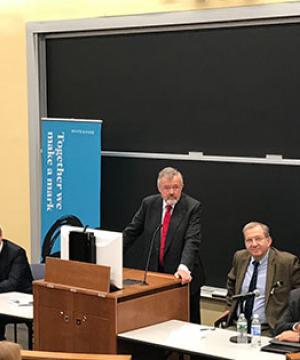The EU Court of Justice Braces for Brexit
As the European Union thrashes out a Brexit transition plan, three representatives of the Court of Justice of the European Union (ECJ) visited Columbia Law School to discuss some of the issues.
Calling Brexit “massively complex,” Judge Ian Forrester of the U.K. joined ECJ Advocate General Nils Wahl; William Valasidis, the ECJ’s director of communications; and Petros Mavroidis, the Edwin B. Parker Professor of Foreign and Comparative Law at Columbia Law School, for the discussion hosted by the Columbia Center on Sustainable Investment, the law firm White & Case, and the EU Delegation to the United Nations.
Emphasizing that their views do not reflect the views of the court, the visitors offered insights into the political and regulatory dimensions of Brexit. All three speakers said they expect uncertainty – and plenty of work for lawyers – for some time to come.
Long-simmering tensions between nationalists and internationalists
Brexit is “an essentially political phenomenon,” said Forrester. Since the 1970s, he explained, “nationalists” and “internationalists” in the U.K. have debated how closely the country should be associated with political aspects of European integration while it also benefits from the common regulatory environment established under EU auspices.
The vote to leave the EU surprised everyone and triggered “a meltdown of political assumptions and leadership,” observed Forrester, who noted that the debate over ties to Europe continues. “For the moment, it is not sure what the long-term nature of the U.K.’s relations with Europe will be,” he said. “For now, the civil service is working on different hypotheses, none of which can be excluded.”
U.K. law will continue to reflect EU law
Since joining the EU in 1973, “the U.K. has managed many aspects of daily life and the economy collectively with its European partners,” noted Forrester.
The result: thousands of pages of regulations that cover everything from agriculture and livestock, to trade and labor, the workplace, food safety, chemicals, the environment, science, policing, judicial cooperation, and recognition of qualifications for the practice of law.
Even following Brexit, the rules may continue to apply in both the U.K. and EU, the panelists observed, leaving judges in both the U.K. and EU to wrestle over how to interpret the rules in ways that minimize disruptions to trade and daily life.
ECJ already is wrestling with Brexit cases
While the EU and U.K. continue to negotiate protections for intellectual property, already there are cases before ECJ that touch on Brexit issues.
For instance, the ECJ is reviewing an appeal of a refusal by the EU to register a trademark in Spain. The EU had found that the trademark infringed upon a trademark held by a company in the U.K., Valasidis reported.
The appellant is arguing that if withdrawal from the EU, once triggered, cannot be reversed, then the court should allow registration of the trademark, on the theory that the U.K. will not be a member of the bloc come 2019. More broadly, the question whether withdrawal can be reversed could itself come before the ECJ, Wahl added.
“The court is bracing for impact because Brexit can have very serious consequences on the court itself,” said Valasidis, particularly, he added, if the U.K.’s withdrawal from the bloc triggers cuts to the court’s budget.
The contributions of the EU
Forrester noted that the EU has brought “two massive contributions” to the continent: the elimination of military rivalry between France and Germany, and the bringing down of the Berlin Wall.
Prosperity flowed from opening borders to both businesses and workers, Forrester noted. “This is a historical fact that should never be forgotten, yet these contributions were under-acknowledged during the campaign over Brexit,” he said.
Forrester read with approval from an article by U.K. Foreign Secretary Boris Johnson in which Johnson observed that “when a community is going through some period of stress... they are historically far more likely to identify and turn on scapegoats in their midst... Your kids can’t get a house? It’s the immigrants... People are only too willing to project their anger on to a particular group, and some politicians, alas, are only too willing to assist.”
Forrester noted that Johnson wrote those comments two years ago. A year ago Johnson became a Brexit hardliner.
Related reading
Cooperation Key to Brexit Talks
Brexit: The Lessons from Trade Wars
###
Posted on Nov. 14, 2017
